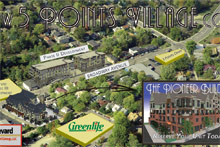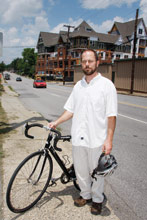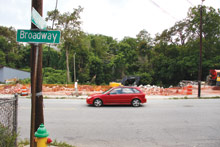Wearing a hard hat and shades, Kevin Kerr taps a column of pinkish stone in the soon-to-be-completed Pioneer Building on Broadway just behind Greenlife Grocery in Asheville.

“We’re building it like they used to,” he says with a nod. “We’re using hard stone. When it’s finished, it will look like it’s been here for ages.”
Kerr is CEO of the Boulevard Development Group. He and his business partner, Jay Lurie, are in the early stages of creating Five Points Village, an ambitious redevelopment of a quarter-mile stretch of Broadway. “There’s going to be new sidewalks, new pedestrians—a life on Broadway,” says Lurie. “It connects to Montford; it connects to downtown.”
A portion of the city’s greenway system connecting downtown to the Botanical Gardens, he notes, will run right by the village.
“That’s part of the whole plan: to have these amenities integrated with everything,” says Kerr.
The two men say they have a vision of a Broadway filled not with abandoned buildings or half-used businesses but with residents (in condos priced at between $279,000 and $500,000), retail and office space.
The Pioneer Building is slated to open in September. And next year, phase II construction is expected to begin: two mixed-use buildings separated by a courtyard, which they hope to complete by 2009. Phase III is planned for a site directly across from the Pioneer Building that’s now being used to store vehicles and construction equipment for the other projects.

When it’s all done, a nearly vacant portion of the Broadway corridor will feature high-end condos, retail and office space stretching from downtown to the Five Points Restaurant. That’s the plan, at any rate.
“Eventually everything from the diner on down is going to get built up,” says Lurie. “Right now a lot of the other phases are under option.”
Meanwhile, the marketing blitz has already begun, with ads in local media (including this paper), a billboard and postcards depicting the Pioneer and the other planned phases, with a little inset urging prospective residents to “reserve your unit today!”
To date, the Pioneer has sold about 60 percent of its units, both residential and commercial, Lurie reports.
“Sales have been good, though the market’s slow,” he notes. “We’ve got spaces available in both residential and commercial. We’re getting tons of good feedback—no complaints from the neighbors.” In recent years, says Lurie, “There’s been nothing down there but bad stuff, just a bunch of loitering…”
Kerr nods, but he’s quick to add, “which has significantly changed over the last few years: We’ve been continually cleaning up the area.”
Five Points reacts
When a big new redevelopment comes into an area, neighborhood residents may have mixed or even outright hostile feelings toward it. But Ben Gilliam, who heads up the Five Points Neighborhood Association, says the residents support new construction along Broadway.
“I’m in favor of Broadway [being] redeveloped: There’s empty buildings all up and down it,” says Gilliam. “I’m in favor of smart growth—growth that doesn’t overwhelm the neighborhood or neighbors.”

The Pioneer Building, he feels, fits that bill. “That’s a good example of development that fits in well with the neighborhood. There haven’t been any complaints from the neighbors about that building as far as I know,” he says. “The only times it’s come up in our Five Points meetings has been people holding that out as an example of how to do it right: a nice, mixed-use building that doesn’t overshadow the neighbors, isn’t going to bring heavy truck traffic onto neighborhood roads—and it’s an attractive building.”
By contrast, Gilliam points to the 11-story Horizon Building on Merrimon Avenue, at the other end of the Five Points neighborhood, as something “we’re firmly opposed to: It’s too big for the area. That [and the Pioneer] are kind of the two sides of this.”
Still, Gilliam says he’s not too worried about downtown-style development rolling down Broadway, due to the area’s zoning.
“It caps buildings at four stories—and we think that’s about appropriate for the area. You might hear something different if someone tried to jam a building up against someone’s back door, but generally I think that’s a workable size.”
In fact, the association’s vision, as described by Gilliam, seems to overlap with Kerr and Lurie’s, at least in some ways. “I’d like to see wider sidewalks [and] bike lanes,” notes Gilliam. “Some people would like to see [Broadway] taken down to three lanes, with parking and bike lanes. I think that would be better for pedestrians and businesses.”
Health Adventure moving in
Kerr and Lurie’s projects aren’t the only redevelopment going on down Broadway these days. The Health Adventure, the science and health-education center currently located in Pack Place, plans to move further up Broadway to a 10-acre spot near UNCA’s Botanical Gardens. There, the organization will build Momentum, a “science and health adventure park” centered around a “34,000-square-foot facility offering healthy food service, a large changing exhibits gallery, and quality health and science exhibits that spark imagination and positive transformation,” according to a plan released by the Health Adventure.
The project’s Web site asserts that the public can expect a groundbreaking “sometime in 2008,” and that the Health Adventure has raised $10 million of the anticipated $25 million required to make Momentum a reality. Donors include the Janirve Foundation, Clear Channel Asheville, the Tourism and Development Authority and local Kiwanis chapters.

The writing is not on the wall
“Broadway is a main artery into downtown, and it’s been a dilapidated area almost forever,” says Lurie, explaining his reasons for choosing to develop that area. “It’s been needing a revitalization. Montford went through its re-gentrification over the last eight years; it’s still going through re-gentrification. Broadway is a gateway to Montford and downtown. A lot of people want to move back to the city.”
In addition, notes Kerr, “There’s also the historical aspect. Broadway was the original artery to downtown. When we designed these, we took a lot of historical buildings into account. We want to create a north Asheville urban village in walking distance of downtown.”
On July 23, Kerr and Lurie’s company demolished the infamous “Pink House,” a dilapidated, graffiti-covered, two-story structure that had sat unused on Broadway for years.
“We found three people living in it,” says Lurie.
“Yeah, the neighborhood was really glad to see that go,” adds Kerr.
By the next day, a chunk of the basement was all that remained—and a backhoe was methodically tearing it apart.
“The graffiti is gone,” Lurie observed with just a bit of a smile, watching the concrete break up. But 20 feet away, two spray-painted tags glistened on the slick sign touting the Pioneer Building.



I think I’ll always be a little sad to see the Pink House go. Not just because of its wild local history, but because it was a style of architecture I really like. I was always hoping it was salvageable and someone would remodel it and open a business there.
I’m glad to see Asheville being invested in and developed really, but I’m always going to miss the old derilict places full of legends. For that matter, I’ll never be able to go to the super Wal-Mart without wistfully thinking of that grand old wreck, the Sayles Bleachery…
A photo with graffiti as they brought it down
[img src=”http://farm4.static.flickr.com/3134/2717043855_6368bf2df7.jpg”]
http://farm4.static.flickr.com/3134/2717043855_6368bf2df7.jpg
I think re-development on Broadway is great, but it MUST be made more pedestrian and bike friendly. Widen the sidewalk and put in bike lanes as part of any new construction!
that was a great grafitti spot.
when did gentrification become a good thing? what i see is more expensive development, good for tourists and rich residents only. montford’s “re-gentrification” has already made large parts of it too expensive for the artists that give this town it’s character, and now the city wants to do that to the five points area, too.
by all means, go right ahead and gentrify your little hearts out. just try to feel a twinge of remorse when you’ve driven out all the artists, characters, and people who can’t afford higher rent and shittier serving jobs.
An applaud to the Pioneer building for using hard stone to build one of Asheville’s future historic buildings. Creative designs with building materials that will allow the building to exist past this current era are the kinds of developments Asheville should encourage more of.
I hope whatever replaces the Pink House will continue those principles, creating a neighborhood revitalization trend along the Broadway corridor.
Zen – that is a marvelous photo. I’m so glad one of our beloved photographers was around to capture it. :-)
[b]Emily:[/b] Not to seem contrary, but as part of the movement that gentrified Montford in the ’90s (and was thus priced out recently) I can say that no one I knew felt too bad about the poor black families that they were displacing.
I can’t imagine the new arrivals to Montford see it any differently. They’re getting rid of poor renters (some may be artists) and replacing them with upstanding owners (some may be artists). It sucks as a trend, and it’s a major reason I’ve left town, but it’s also a kind of karmic payback in a way.
Montford is certainly safer now than when I moved to Asheville in ’93. Back then walking down the street or to the park was an adventure.
In any case, I’ll miss the pink house for it’s wild history yes, but the new development here seems to be done in a good manner. I’ve gotta agree with JBo.
A little history on Montford; originally it was a neighborhood populated by local businessmen, doctors, lawyers, merchants of all flavors and so on (yeah artists too). It was, in the early 20th century what would be considered a solid middle to upper middle class neighborhood. The late 50’s, 60’s & 70’s (when I was growing up in Asheville) saw Montford fall into a quasi slum. The revitalization my neighborhood has undergone in the last 10/15 years is only returning it to it’s former beautiful self and what it was always intended to be. Jay/Kevin – Nice work.
topr!